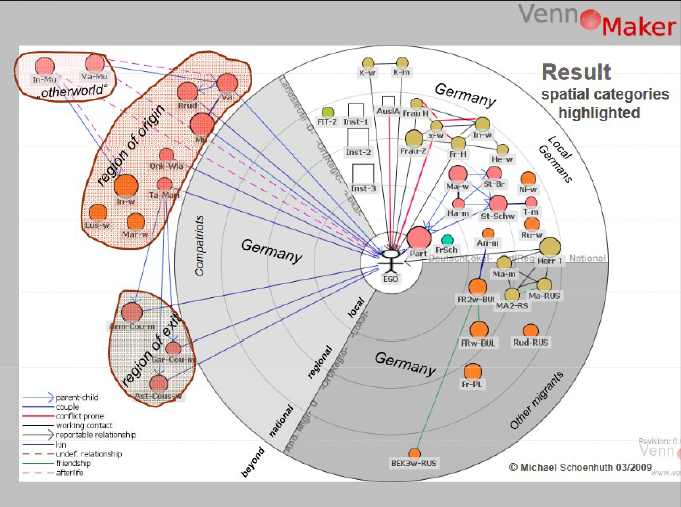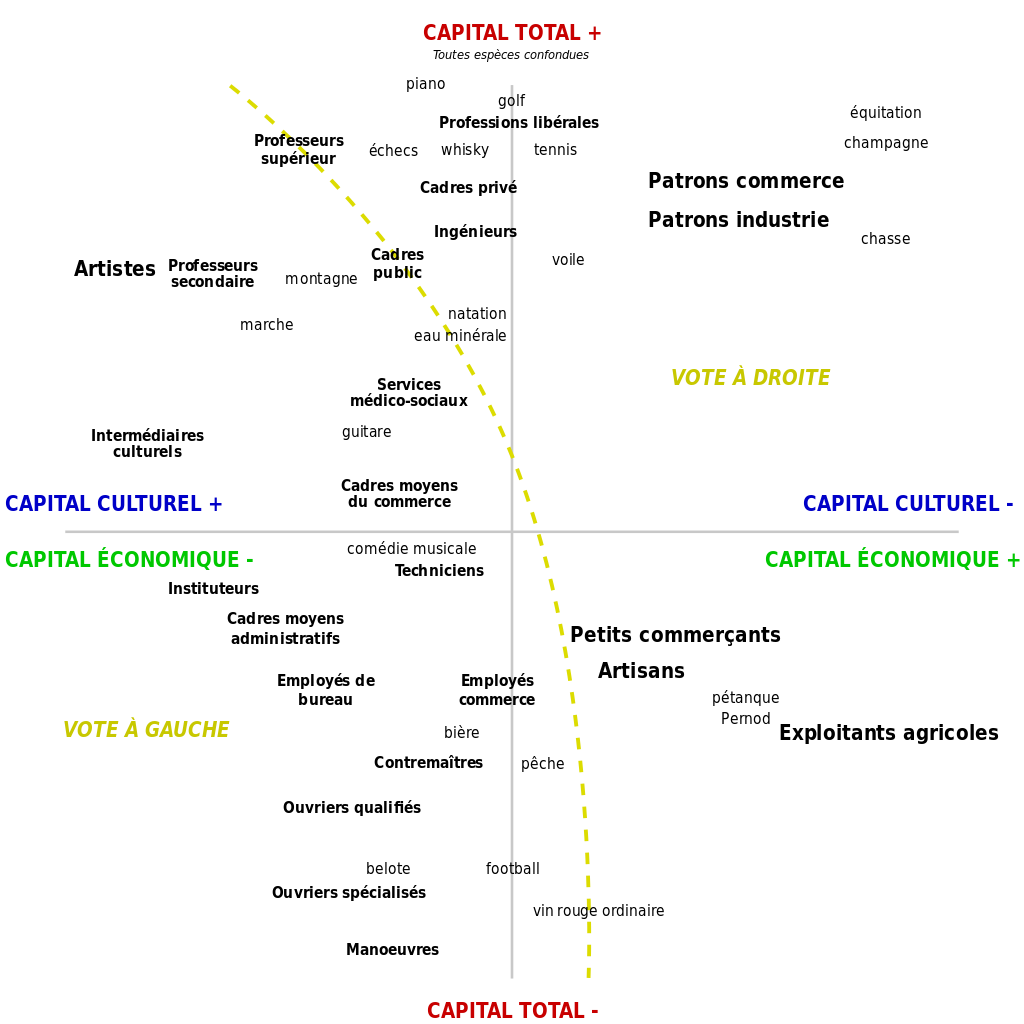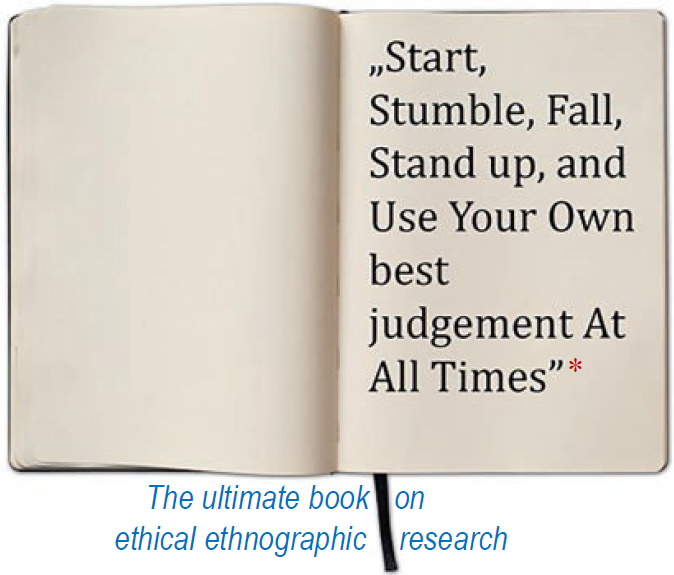IX. Complexity
Doing ethnographic fieldwork in a complex world

Tip: Network Sociograms to clarify actors/stakeholders in the field
Software: Venn Maker (open access!);
Tutorial
- More and more ethnographers find themselves working in complex field settings. Going global for ethnographers has meant working with and between a range of individual and, at times, institutional actors.
- Multi-sited research, research in interdisciplinary contexts, with applied or transfer-oriented project components, mixed teams, research between countries, institutions, organizations, each with different expectations, (ethical) rules, regulations and governance structures shape today’s research endeavors.
- Points to ponder: Who are the main actors/ gatekeepers that structure or impinge on your chosen area of research? How do you (de-)construct your field? Whose rules do you have to follow, whose rules would you like to follow? Are there options for negotiation? (see also: Garner 2005)
- And last but not least: What might be your different roles in the field?
- See the slide ‘Intervene or not’ in Chapter III. ‘Field Conduct’ under the section: ‘Anticipating Harms’, to get an impression of how you can create such an actor’s diagram easily with a paper and pencil method.
Good reads:
• On “Competing Ethical Obligations” in field research see this
• Crawford, Gordon/Kruckenberg, Lena/J. Loubere, Nicholas/Morgan, Rosemary. 2017. Understanding Global Development Research: Fieldwork Issues, Experiences and Reflections. London: Sage Publications.
Self and other: shifting positionalities
Buzz Group:
• Can we escape ‘othering’ or being ‘othered’ – at least temporarily?
• Attributions of skin colour (“race”), class (“milieu”), gender, body, but also age, religion, region of origin, etc. create lines of difference that have varying effects on positionalities in the field.
• How do these forms of intersectionality relate to issues of power, knowledge production, or ethical responsibilities as a researcher?
Ethnographic literature usually discusses the positioning of researchers as insiders or outsiders on whether a researcher is part of the culture studied or external to it. This has changed.
- Weiner-Levy, an Israeli studying women from the Druze minority and Abu Rabia Queder studying her own people from the Bedouin community show how fluid positionalities in the field can be, where “[..] at times, belonging to the same culture or people and the consequent expectations of similarity might actually accentuate differences in status and lifestyle between researcher and participants, [..and an] alien researcher may be perceived unexpectedly as an insider regarding specific aspects of the participants’ experiences and content world.” [2011:1163]
- Doing his Masters degree in Germany, visual anthropologist Solomon Mekonen, had to recognize himself “[..]as a being who is othered in a racial classification that was not consciously part of my self-identification before I came to study in Berlin.” [2021: 9] He also draws a comparative perspective to the domestic intercultural power relations in his country of origin, Ethiopia, where the ethnic group to which he belongs, the Amharas, do the othering.
Good reads:
• Weiner-Levy, Naomi &, Abu Rabia Queder, Sarab. 2012. Researching my people, researching the ‘other’: field experiences of two researchers along shifting positionalities. Quality& Quantity 46, 1151–1166.
• Mekonen, Solomon A. 2021. I am Black Now: A Phenomenologically Grounded Autoethnography of Becoming Black in Berlin. Online-Essay.
• See also his award winning film: Emails to my little sister: Trailer: https://vimeo.com/solomonz.
COVID and the end of ethnographic presence
Experiments in ‘multimodal ethnography’
Buzz Group:
• Has ethnographic fieldwork in its classical form become obsolete?
• Would ‘letting anthropology burn’ permit us “[..] to imagine a future for the discipline unmoored from its classical objects and referents,” as Ryan C. Jobson (2020:261) wrote in an essay recently?
• Find arguments for and against this position. To which fields would it be easily to apply, to which ones rather not?
• What about the ecological savings potential?
- In 2020/21 a world in quarantine brought all ethnographic fieldwork ‘in situ’ to a halt. But does the field need the physical presence of the ethnographer at all? Collins and Durington argue for a new form of ‘networked anthropology‘, [..]”with people who are physically (not virtually) in their communities, and with whom we can interact digitally” [2020: 93].
- Their ‘bridging digital divide’ project in Baltimore engages local residents as ethnographers. The anthropologists only initiate the process and assist as consultants via regular Zoom-meetings and the help of ‘Padlet’, a digital interactive pin-board, thus turning fieldwork into a community-led ethnography in a setting of ‘experimental collaborations’ (cf. Estalella/ Criado 2019).
- Collins and Durington see this also as a way out of the dilemma that even in an anthropology striving to decolonize itself the angst of gaining (scientific) legitimacy by presence in the field would contradict the ethos pursued. [2020: 95]
Good reads:
• Jobson, Ryan Cecil. 2020. The Case for Letting Anthropology Burn: Sociocultural Anthropology in 2019. American Anthropologist, 122, 2, 259–271.
• Collins, Samuel Gerald & Matthew Slover Durington. 2020. The Case for letting anthropology be quarantined: COVID and the end of ethnographic presence. entanglements 3,2, 92-96.
Ethics ends when dialogue ends
Towards a transactional ethics

Diagramme représentant schématiquement l’espace social selon fr: Pierre Bourdieu. Source: https://commons.wikimedia.org/wiki/File:Espace_social_de_Bourdieu.svg 10 November 2006. Simplified and inspired by Raisons pratiques, Seuil, coll. Points, 1996, p. 21. Author: Nicolas Lardot
- In his article on “Understanding” in 1996, Pierre Bourdieu speaks of a structural bias inherent in empirical social research, which assigns a powerful and potentially violent position to the researcher from the onset:
- “lt is the investigator who starts the game and who sets up its rules: it is most often she who, unilaterally and without any preliminary negotiations, assigns to the interview its objectives and uses, and on occasion these may be poorly specified – at least for the respondent. This asymmetry is underlined by a social asymmetry which occurs every time the investigator occupies a higher place in the social hierarchy of different types of capital, especially cultural capital” (Bourdieu 1996: 19).
- To overcome this structural asymmetry, Wolff-Michael Roth 2018 proposes a transactional approach to research ethics, which focuses on the dual direction of the effects on the researcher–participant relation, where the question of power is not unilaterally attributed to the researcher, and…
- “[..]where form and content of the ongoing conversation between researcher and participant are dialogic, that is, open to continual development[..] such that ethics ends ‘when dialogue ends’.” [Roth 2018: 27/28]
Good read:
• Bourdieu, Pierre. 1996. Understanding. Theory, Culture & Society 13,2, 17-37. https://doi.org/10.1177/026327696013002002.
• Roth, Wolff-Michael. 2018. A Transactional Approach to Research Ethics. Forum Qualitative Sozialforschung/Forum: Qualitative Social Research 19, 3, Art. 1, http://dx.doi.org/10.17169/fqs-19.3.3061.
The ultimate book on ethical ethnographic research

* I have taken this quote from a workshop of one of my mentors, Robert Chambers, on participatory methods in the 1990s. It was the only sentence in a book of otherwise blank pages, titled: “The ultimate participatory methods handbook.”
On ethical dilemmas in professional practice
- “Fieldwork, however much one plans, tends to be a messy experience.
- Doing ethnography requires participation, risks, mistakes and plain luck (both good and bad).” (Garner n.d. (b)